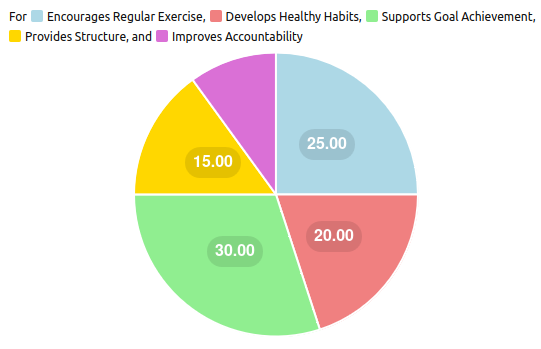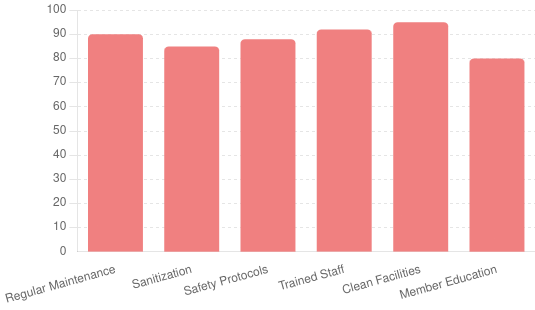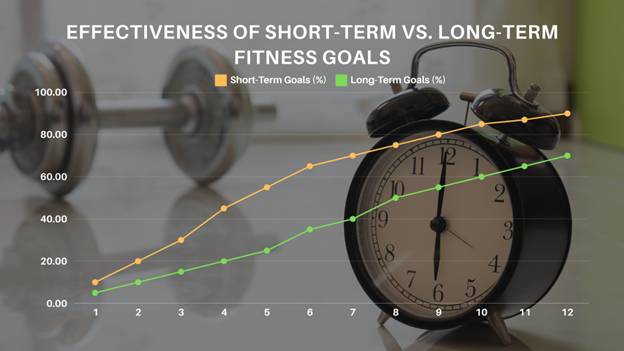Joining a fitness club offers numerous benefits beyond just improving physical health. These clubs provide a structured environment where individuals can achieve their fitness goals through access to high-quality equipment, professional guidance, and diverse workout programs. But the advantages extend far beyond the workout itself. Here are some key benefits of joining a fitness club:
1. Access to Professional Expertise
Fitness clubs often employ certified trainers and fitness experts who can provide personalized workout plans, nutritional advice, and professional guidance. This expertise helps members to maximize their workout efficiency, prevent injuries, and achieve their fitness goals faster.
| Aspect | Description |
| Certified Trainers | Fitness clubs employ certified trainers who create personalized workout plans tailored to individual fitness goals and needs. |
| Nutritional Guidance | Access to professional nutritionists who provide dietary advice and meal plans to complement fitness routines. |
| Injury Prevention | Trainers help prevent injuries by teaching proper exercise techniques and providing guidance on safe workout practices. |
| Goal Setting | Professional expertise helps members set realistic fitness goals and track their progress effectively. |
| Motivation and Support | Trainers offer motivation and support, helping members stay committed to their fitness journey. |
| Specialized Programs | Availability of specialized fitness programs such as weight loss, muscle building, and rehabilitation designed by experts. |
| Workshops and Seminars | Regular workshops and seminars on various health and fitness topics conducted by professionals. |
| Fitness Assessments | Professional assessments to evaluate current fitness levels and develop customized fitness plans accordingly. |
2. Diverse Workout Options
Most fitness clubs offer a wide range of activities, from cardio and strength training to yoga, pilates, and group fitness classes. This variety keeps workouts interesting and engaging, reducing the likelihood of boredom and burnout. Members can explore different types of exercise to find what they enjoy most.
| Workout Option | Description |
| Cardio | Aerobic exercises that improve cardiovascular health, such as running, rowing, and elliptical training. |
| Strength Training | Exercises that build muscle strength and endurance using weights, resistance bands, or body weight. |
| Yoga | Mind-body practice that combines physical postures, breathing exercises, and meditation for holistic health. |
| Pilates | Low-impact exercises focusing on core strength, flexibility, and body awareness. |
| Group Fitness Classes | Classes that offer a variety of workouts in a group setting, such as aerobics, boot camps, and Zumba. |
| Dance Fitness | Fun, high-energy classes that combine fitness and dance, such as hip-hop or salsa. |
| Cycling | Indoor cycling classes that simulate outdoor biking experiences with varied intensity levels. |
| Swimming | Swimming laps, water aerobics, and other water-based exercises for full-body workouts. |
| HIIT (High-Intensity Interval Training) | Short bursts of intense exercise followed by rest or low-intensity exercise, designed to burn fat quickly. |
| Martial Arts | Training in disciplines like karate, taekwondo, or judo that enhance physical fitness and self-defense skills. |
3. Community and Support
Joining a fitness club creates a sense of community. Working out alongside others with similar goals can provide motivation and accountability. Many clubs also organize social events, challenges, and group activities that foster a supportive environment and build lasting friendships.

4. Improved Mental Health
Regular physical activity is known to reduce stress, anxiety, and depression. The social interaction, routine, and endorphin release associated with gym workouts contribute significantly to mental well-being. Many clubs also offer mindfulness and relaxation classes like meditation or tai chi, further supporting mental health.
| Mental Health Benefit | Description |
| Stress Reduction | Regular exercise helps reduce stress by lowering cortisol levels and releasing endorphins. |
| Anxiety Relief | Physical activity can alleviate anxiety symptoms through the release of neurotransmitters like serotonin. |
| Depression Management | Exercise is effective in managing depression by increasing the production of endorphins and improving mood. |
| Increased Self-Esteem | Achieving fitness goals and improving physical appearance can boost self-esteem. |
| Improved Mood | Physical activity leads to the release of endorphins, which enhance mood and overall well-being. |
| Enhanced Cognitive Function | Regular exercise improves cognitive functions such as memory, attention, and processing speed. |
| Better Sleep | Exercise promotes better sleep patterns and improves the quality of sleep. |
| Social Interaction | Fitness clubs provide opportunities for social interaction, which can combat feelings of loneliness and isolation. |
| Routine and Structure | Joining a fitness club helps establish a routine and provides structure to daily life. |
| Mindfulness and Relaxation | Many fitness clubs offer classes focused on mindfulness and relaxation, such as yoga and meditation. |
5. Structured Environment
A fitness club provides a dedicated space free from the distractions of home. This structured environment helps individuals stay focused on their fitness routines. The availability of amenities like locker rooms, showers, and recovery zones enhances the convenience and overall experience.

6. Health and Wellness Programs
Beyond physical fitness, many clubs offer comprehensive health and wellness programs, including nutrition workshops, wellness seminars, and health screenings. These programs educate members on maintaining a balanced lifestyle and making informed health choices.
| Program Type | Description |
| Nutrition Workshops | Educational sessions on nutrition, healthy eating habits, and meal planning. |
| Wellness Seminars | Seminars on various health topics such as heart health, diabetes management, and mental well-being. |
| Health Screenings | Routine health screenings to monitor blood pressure, cholesterol levels, and other health metrics. |
| Personal Training | One-on-one training sessions with certified trainers to achieve personalized fitness goals. |
| Group Fitness Classes | Classes that offer various fitness activities like aerobics, yoga, and strength training in a group setting. |
| Mindfulness Programs | Programs focused on mindfulness, meditation, and relaxation techniques to improve mental health. |
| Rehabilitation Services | Services aimed at helping individuals recover from injuries and improve physical function. |
| Weight Management Programs | Programs designed to help individuals manage their weight through diet and exercise. |
| Smoking Cessation Programs | Support programs to help members quit smoking and improve their overall health. |
| Stress Management Workshops | Workshops that teach stress management techniques such as deep breathing, yoga, and meditation. |
7. Consistency and Routine

Having a membership encourages consistency and the development of a regular exercise routine. Many people find it easier to stick to their fitness goals when they have a specific place to go and scheduled classes to attend.
8. Motivation and Challenge
Fitness clubs often create a motivational atmosphere with energetic classes, challenging workouts, and inspirational trainers. Participating in group classes or fitness challenges can push members to work harder and achieve more than they might on their own.
| Motivation and Challenge Aspect | Description |
| Energetic Classes | Classes that are designed to be high-energy and engaging, keeping members motivated. |
| Challenging Workouts | Workouts that push members to their limits, helping them achieve new fitness milestones. |
| Inspirational Trainers | Trainers who inspire and motivate members to give their best effort. |
| Fitness Challenges | Organized fitness challenges that encourage friendly competition and goal setting. |
| Goal-Oriented Programs | Programs that focus on achieving specific fitness goals, keeping members driven. |
| Progress Tracking | Tools and methods for tracking progress, which helps maintain motivation. |
| Positive Atmosphere | A positive and encouraging environment that keeps members motivated. |
| Rewards and Recognition | Recognition and rewards for achievements, boosting member morale. |
| Supportive Community | A community of like-minded individuals who provide support and encouragement. |
| Variety of Programs | A wide range of programs to prevent monotony and keep members challenged. |
9. Safety and Cleanliness

Reputable fitness clubs prioritize safety and cleanliness, regularly maintaining equipment and ensuring a hygienic environment. This focus on safety allows members to exercise with confidence and peace of mind.
Tips for staying motivated at the gym
Staying motivated at the gym can be challenging, but here are some tips to help keep you on track:
1. Set Clear Goals
- Specific: Define exactly what you want to achieve.
- Measurable: Track your progress with measurable benchmarks.
- Achievable: Set realistic goals that you can attain.
- Relevant: Ensure your goals align with your broader objectives.
- Time-bound: Set a deadline to keep you focused.
2. Create a Routine
- Schedule specific times for your workouts.
- Treat gym time like an important appointment you cannot miss.
- Consistency helps make exercise a habit.
3. Track Your Progress
- Keep a workout journal or use an app to log your activities.
- Track improvements in strength, endurance, and other metrics.
- Celebrate small milestones to keep yourself motivated.
4. Mix It Up
- Incorporate different types of exercises to avoid boredom.
- Try new classes or workout styles to keep things interesting.
- Change your routine every few weeks.
5. Find a Workout Buddy
- Partnering with someone can make workouts more enjoyable.
- A buddy can provide encouragement and accountability.
- Compete with each other to push your limits.
6. Hire a Personal Trainer
- A trainer can provide personalized workouts and professional guidance.
- They can help keep you motivated and accountable.
- Trainers can introduce you to new exercises and techniques.
7. Set Up Rewards
- Reward yourself for reaching milestones (new workout gear, a massage, etc.).
- Use non-food rewards to maintain healthy habits.
8. Stay Positive
- Focus on the benefits you’re experiencing, like increased energy or improved mood.
- Avoid negative self-talk and be kind to yourself.
- Remind yourself why you started and the progress you’ve made.
9. Use Music and Entertainment
- Create a playlist of your favorite upbeat songs.
- Listen to podcasts or audiobooks during workouts.
- Use music to boost your mood and energy levels.
10. Join a Class or Group
- Group classes provide structure and a sense of community.
- The social aspect can make workouts more fun.
- Instructors can offer motivation and ensure you’re performing exercises correctly.
11. Visualize Success
- Imagine how good you’ll feel after a workout.
- Visualize reaching your fitness goals and the benefits that come with them.
- Use visualization techniques to keep yourself motivated.
12. Stay Flexible
- Life can be unpredictable, so allow some flexibility in your workout schedule.
- If you miss a session, don’t get discouraged; just get back on track the next day.
- Adjust your routine as needed to fit your lifestyle and keep things manageable.
13. Remember Your Why
- Constantly remind yourself why you started your fitness journey.
- Keep your reasons in mind to stay motivated during tough times.
- Write down your motivations and review them regularly.
14. Join a Fitness Community
- Online or in-person communities can offer support and motivation.
- Sharing your journey with others can provide inspiration and accountability.
- Participate in challenges or events to stay engaged.
Incorporating these tips into your fitness routine can help you stay motivated and make the most of your time at the gym.
Conclusion
Joining a fitness club offers far more than just a place to work out. It provides a comprehensive approach to health and wellness, combining physical fitness with professional guidance, community support, mental health benefits, and educational resources. Whether you’re a fitness novice or a seasoned athlete, a fitness club can be a valuable ally in your journey towards a healthier, happier life.

